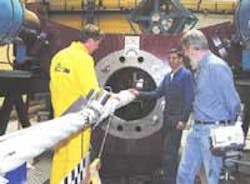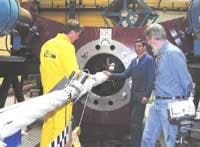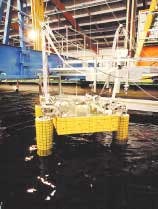Ifremer Institute conducts numerous activities in offshore exploration and production
Ifremer, is the French research institute, located in Brest, dedicated to the exploitation of the sea. Ifremer has both industrial and commercial objectives. The institute has been asked to develop and manage both technology and equipment for marine explor-ation. This exploration includes everything from the ocean's surface to its deepest depths. The goal is to increase and improve scientific know how which would lead to a better understanding of the oceans. Ifremer also is charged with evaluating and exploiting the ocean's resources, while at the same time preserving the health of the seas for future generations.
Specific to the development of offshore oil and gas resources, Ifremer offers a variety of services in the areas of research and development, consultancy, and research partnerships. Each of these options shares the common goal, which is the safe exploration and production of our oceans resources. Because Ifremer's activities cover such a wide range of marine sciences and technologies, it maintains a variety of facilities including research vessels and other equipment. The institute's fleet is comprised of several vessels, two manned submarines, and a Remotely Operated Vehicle, rate for 19,600 ft water depth. The institute also has at its disposal a full set of deep and shallow water survey equipment.
Ocean margins
For many years, Ifremer has conducted research in geosciences as they apply to the deep ocean. A more recent program conducted by Ifremer in cooperation with the oil industry was related to the ocean margin where oil reservoirs are present. This particular program concerns the structure of the margin, the sedimentary processes, and the effects of turbidity. An important component of the exploration activity is related to geohazards. These factors can anticipate slope stability, expand the understanding of what role gas hydrates play, and potential for fluid to escape.
To conduct these studies Ifremer uses its oceanic vessels equipped with dedicated tools such as multibeam sonars, a sediment profiler, 3D, high resolution seismic, 3D very high resolution seismic, an acoustic towed vehicle, and the deep sea ROV. The manned submarine and a CPT penetrometer.
Modeling of processes is an important component of this research. To accomplish this, Ifremer applied a new computer program designed for seabed monitoring. The program uses input from an array of specially developed sensors, which report pore pressure measurement. These sensors are linked using acoustic transmission. New data acquired by this system are expected to improve the industry's understanding of seabed phenomena.
Such programs have been conducted with TotalFinaElf in the Gulf of Guinea, and with industrial partners and other operators in the Northeast Atlantic, North Sea, Mediterranean, and Black Sea.
Environmental studies
A program is currently being conducted, by Ifremer to study the possible influence of hydrocarbons on deep-sea flora and fauna. In conducting such a study, it is important to note that the deep-sea environment plays host to chemio-synthetic bacteria. Such organisms use hydrocarbons, or methane gas, produced by natural deep-sea vents or cold seepage. This study uses dedicated bioassays tests to better understand the influence of drilling cuttings on these bacteria. Ifremer is also involved in the development of automated systems, such as the Marel system, which gather data on environmental parameters on site. This particular system is now commercially available.
Behavior of offshore installations
Ifremer also conducts studies of how the actions of the various marine environments affect offshore installations. These programs are focused on new designs such as those for Floating Production Storage, and Offloading vessels or the requalification of existing jackets.
Metocean studies are conducted by Ifremer in cooperation with various partners. By teaming with different groups, the institute believes in will collect more reliable data for the new design of offshore installations both in coastal areas and in the open sea.
Ifremer has participated in several JIP's with the OGP forum such as WACSIS.
The institute also has hosted research into the interactions of fluids and structures. Ifremer conducts tests in its own deep and circulation basins simulating various metaocean conditions and performing tests on small, scale models. Recent studies conducted at these facilities include a wellhead barge, LNG storage floating support, and the behavior of risers. In addition to these elaborate facilities, Ifremer, of course, performs numerical modeling of such interactions. In conducting such modeling it is critical that the software be properly calibrated by applications in the test basin.
For fixed bottom platforms, and subsea equipments soil mechanics are a key consideration. Recognizing this, Ifremer conducts programs aimed at developing methodologies to obtained improved data on soil properties. These programs seek to derive the correlation between geophysical and geotechnical data. Ifremer also is leading a program, with cooperation from French partners, to draft new recommendations on the design of suction anchors.
In the area of material science, Ifremer has a long-running study concerning the behavior of materials in marine environment. Recent programs concern the risk of hydrogen embrittlment of high-strength steel (500 to 1,000 MPa). Ifremer has conducted another program for the WADO group. This study is meant to determine the properties of synthetic ropes, and their application in deepwater mooring programs. Materials under review include Polyester, Aramid, and PEHM. The ageing of materials for thermal insulation of risers is also an important subject presently being addressed at the institute. This has been extensively investigated and is the focus of a currently proposed JIP (TIDEEP). Ifremer also is concerned with the subject of Fiber Reinforced Plastic composites and their application in underwater equipment such as deepwater separators. Ifremer also is looking at cathodic protection design for offshore installations using accurate data and numerical modeling such as Procor.
The monitoring and reliability of offshore structure is another area of concern for Ifremer. The institute is involved in programs focused on risk-based inspection. Ifremer also led a program investigating the intercalibration of offshore non-destructive testing with European partners. Initially this research focused mainly on jackets, but the scope has been expanded to consider FPSOs as well. Monitoring of offshore installations is another area of developing interest for the institute, especially the use of acoustic methods and dedicated sensors.
One enabling technology critical to deepwater operations is underwater vehicles. Recognizing this, Ifremer participates in the development of underwater vehicles and associated equipment. This participation includes the development of vehicles for survey work, or for some IMR tasks. For instance, Ifremer participated in the Swimmer project, led by Cybernetix. Ifremer possesses considerable expertise in telemanipulation and conducted an international program called Evaluation of Diverless IRM for Subsea Completions and Deepsea Structures (EDICS). The institute understands that the extensive use of AUVs could expand the options of deepwater operations in the near future. To that end, Ifremer is collaborating in several programs, such as the development the AUV Alistar lead by ECA. This research is crucial to the development of key AUV technologies including power supply and data transmission. Ifremer has R&D programs for fuel cells, Li ion batteries, and the all-important acoustic transmission. Recently acquired results allow the institute to envisage a design that would use a horizontal acoustic link instead of umbilicals to transmit data in some applications. Underwater positioning is another, related technology. Ifremer is involved in improving technologies such as Ultra-short Base (USB) equipment.
All of these activities are conducted in partnership or on behalf of many companies or organizations. Ifremer partners and customers are not only from France, but also countries around the world. In addition to the capabilities listed above, other services can be found at Ifremer such as a database on oceanic climatology and bathymetry. Dedicated software is available including Caraïbes, used for sonar data treatment (bathymetry and soil characterization correlated with reflectivity).


